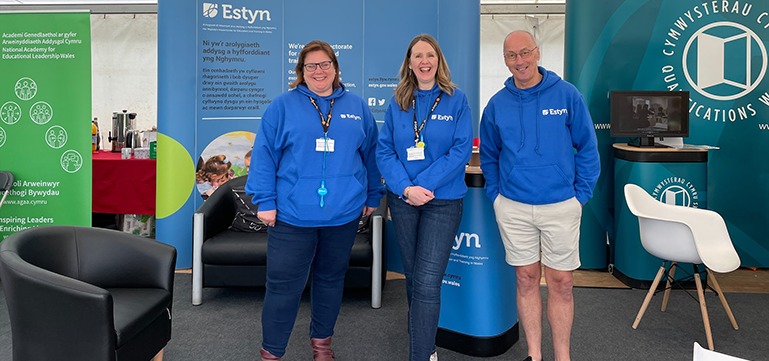
Three leaders in the Welsh education sector will be welcoming guests at this year’s Urdd Eisteddfod.
As Urdd Gobaith Cymru celebrates its centenary year, this year’s Urdd Eisteddfod will be held in Denbighshire to mark the location of where the first Urdd National Eisteddfod was held in 1929.
Qualifications Wales, Estyn and National Academy for Educational Leadership Wales are sharing a stand at this year’s Urdd Eisteddfod, which runs from Monday 30 May to Saturday 4 June.
Throughout the week, the regulator, inspectorate, and Leadership Academy will be updating visitors to stand 12-14 on changes to the Welsh education system, with a focus on curriculum reform.
On Wednesday 1 June, visitors are invited to watch a live question and answer panel session between the three organisations and Jeremy Miles, the Minister for Education and the Welsh Language, which starts from 11.30am.
David Jones, Chair of Qualifications Wales, says:
We’re thrilled to be attending this year’s Urdd Eisteddfod with Estyn and the National Academy for Educational Leadership Wales. After the last two years, we’re grateful to be attending shows and events such as these so we can speak to the public face to face.
The Urdd Eisteddfod is a timely opportunity to update visitors on Welsh language provision, especially on our Choice for All strategy which sets out our vision for increasing the availability of Welsh-medium qualifications, and our Welsh language support grant work.
We encourage visitors to speak to us about taking part in our Qualified for the future curriculum reform work. We’ve been working closely with learners, teachers, parents, carers and others to help shape the new GCSE qualifications which are due to be introduced in September 2025. We’ll be sharing an update on this programme of work as part of Wednesday’s question and answer session, which is open to everyone.
The panel session, which will be held at stand 12-14, will see the three organisations and the Minister asked a series of questions relating to the Welsh education system and their roles within the system, before visitors are asked to participate in the conversation. The session is expected to last 30 minutes.
Minister for Education and Welsh Language, Jeremy Miles, comments:
It’s a really exciting time for education in Wales, with schools getting ready to start teaching our new curriculum from September. It’s important we engage with as many learners, teachers and everyone in education on our new curriculum and the future of qualifications – and what better place to do that than at the Urdd Eisteddfod, one of the biggest and most important events in our cultural calendar.
Tegwen Ellis, Chief Executive of the National Academy for Educational Leadership Wales, says:
If we are to achieve the national ambition set out for our learners, then it goes without saying that working in partnership is a priority. That’s why this week, at the Urdd Eisteddfod, it is a great opportunity for the three organisations to work together in promoting and providing a greater understanding of the role we all play in supporting the education system. We look forward to talking to learners, parents, teachers and leaders from across Wales, together.
As well as having a chance to speak to staff from each of the three organisations, there’s a space for younger guests to take part in arts and crafts activities.
Owen Evans, Her Majesty’s Chief Inspector at Estyn, adds:
We are very pleased to have a presence at this year’s Urdd Eisteddfod in its landmark centenary year and after it reacted with such purpose over the pandemic. After two years of working with education providers, parents and learners through a series of virtual engagement visits, it’s great to now be able to open up these conversations in a face-to-face setting. I’m also pleased we’ll be sharing space with two of our educational partners.
Alongside Qualifications Wales and the National Academy for Educational Leadership, our team will be on hand to welcome visitors and talk about the opportunities and the challenges ahead as well as the changes we will be implementing as we return to our inspections and nearer normal activities.
We will be rolling out our new inspection arrangements in September and are working closely with a range of partners to ensure that the new framework aligns with and supports the new curriculum. I would encourage people to visit our stand to find out more and share their views.
For more information about the three organisations please visit the Qualifications Wales website qualificationswales.org, the National Academy for Educational Leadership Wales website nael.cymru and the Estyn website estyn.gov.wales.





